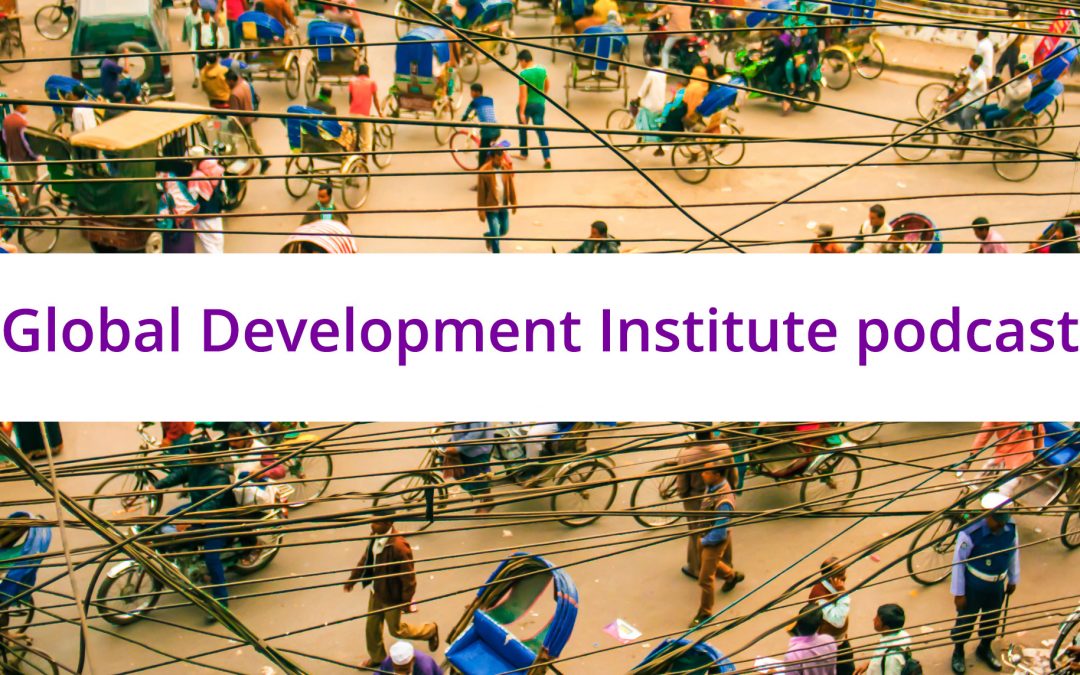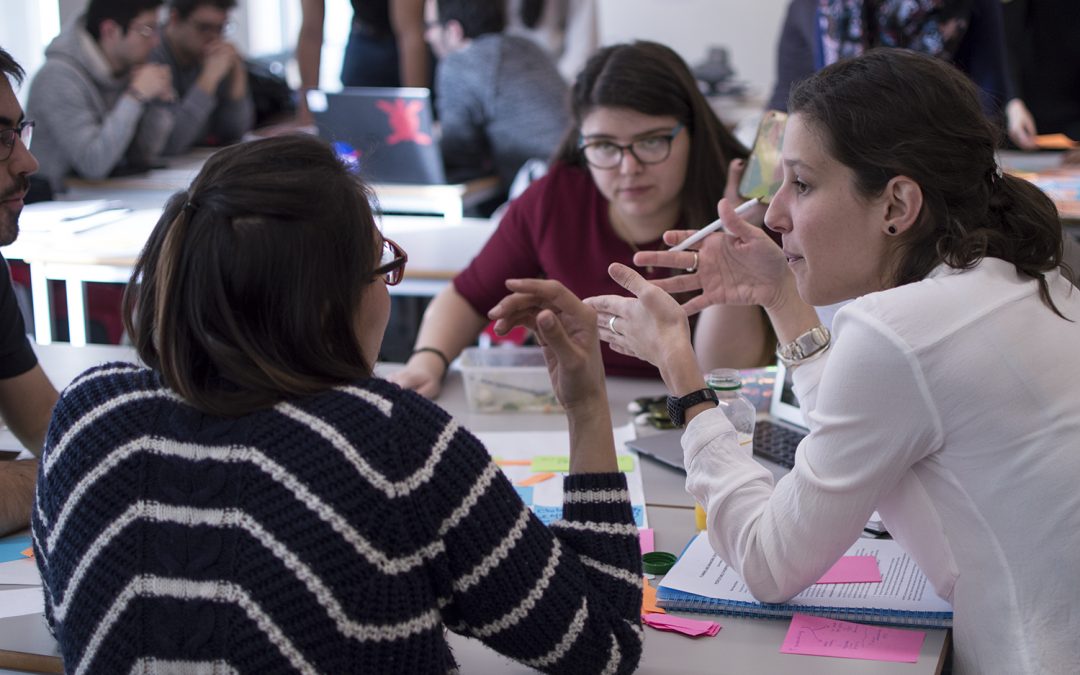
Global value added network from 2002 to 2014: whither Britain?
Gindo Tampubolon, Lecturer in Poverty, Global Development Institute
A short BBC video on How cars are made opens up a view to global production networks traversing the world today. Honda automobile plant in Swindon (Britain) imported alloy wheels for its cars from Ghent (Belgium), delivered in just 8 hours! With tens of thousands other parts assembled into a car, each imported alloy wheel will roll out of Swindon and most likely be exported across the Channel to a third European country. Hondas and other cars assembled in Britain are apt to be found in forecourts and showrooms across Europe.
The production of cars and most goods today, from trousers to smartphones in their pockets, are unlikely wholly made in one place. Production networks are global. These networks make measuring value added in global production not entirely straightforward. Not all the value of automotive export from Honda’s Swindon plant should be assigned to Britain; some should be assigned to Belgium and other countries making the other parts. With tens of thousands of parts involved, opportunities for double-counting abound.

Tackling the youth employment crisis in Tanzania: What can we learn from a project that didn’t work?
Dr Nicola Banks, Lecturer in Urban Development, Global Development Institute
An opportunity arose to pilot an innovative and sustainable revolving savings fund with young motorcycle taxi drivers in Arusha. It didn’t work, but there are important lessons to be learned.

In Conversation: SDGs three years on – are we making progress?
As the 73rd session of the UN General Assembly convenes to review the world’s three year progress against the Sustainable Development Goals, Jennifer O’Brien, Director of Social Responsibility for the School of Environment, Education and Development talks to Prof David Hulme, Executive Director of GDI.
Further reading on the SDGs and review of the MDGs read more…

Pioneers of the GDI Merit Awards arrive in Manchester
There is always a buzz around the start of academic term as thousands descend on campus from around the country – and also around the world. Inductions are held, friends are made as students get united by being lost on campus, students are accosted by information and freebies and everyone is smiling, looking at maps or giving directions.
In a small room traditionally reserved for the ‘Keeper’ in the historic Whitworth building there was a truly special atmosphere as the Global Development Institute welcomed the inaugural recipients of their new masters scholarships the GDI Merit awards; six students chosen from more than 2,700 who applied in a short 5 week period to undertake their first post-graduate studies outside of Africa.

Policy recommendations to save the whole of humanity
By Dr Stacy-ann Robinson, Voss Postdoctoral Research Associate in Environment and Society, Brown University and GDI Alumna
When the Twentieth Conference of Parties to the United Nations Framework Convention on Climate Change (COP20) ended in Lima, Peru in December 2014, the Prime Minister of Tuvalu spoke to the assembled delegates with desperation. The tiny Pacific island loses a few millimetres of ground every year to rising sea water.
“I carry a huge burden and responsibility. I carry their hopes that there will be a future for Tuvalu. This is an enormous burden to carry. It keeps me awake at night. No national leader in the history of humanity has ever faced this question. Will we survive or will we disappear under the sea? I ask you all to think what it is like to be in my shoes. Stop and pause for a moment. If you were faced with the threat of the disappearance of your nation, what would you do?”, said Enele Sosene Sopoaga.

5 top tips for new PhDs
You’ve got a passion for research and your subject and now three years (or more) lies between you and 80,000 of your best words on that subject. We asked our recent PhD graduates and those toiling through their final years to share a few candid tips for success. Here’s what they had to say. read more…

‘We Are Still Here’: Returning to Dhaka, Bangladesh
Dr Sally Cawood, a PhD Alumna of the Global Development Institute recently returned to Bangladesh to feedback her PhD findings on Community Based Organisations (CBOs), water and sanitation in Dhaka’s low-income settlements. This blog shares some reflections on reconnecting with the NGOs, urban poor groups and communities involved in the research.
1: A Waiting Game
On the 20 June 2018, three years after I was in Dhaka to conduct PhD fieldwork, I arrived back in Bangladesh for a much anticipated follow up trip. I planned to return much sooner but, sadly, previous attempts to do so were delayed by security concerns, finalising my PhD and starting a new job. It was the latter, however, that gave me the opportunity to go back. Shortly before completing my PhD, I joined a fantastic team of ‘WASHies’ at the University of Leeds (people who, like me, are passionate about Water, Sanitation and Health, or WASH).
I’m currently a Research Fellow working on the Bill and Melinda Gates-Funded Climate and Cost in Urban Sanitation (CACTUS) Project. My trip to Bangladesh was therefore threefold – scope for CACTUS, supervise an MSc research project, and feedback the PhD findings and revisit the communities I worked in – something I’d been waiting to do for a long time!

Making spaces for co-production
Wayne Shand, Global Development Institute Honorary Research Fellow
The rising profile of inclusion and urban development in international policy has enlivened discussion about the role of organised communities in improving the conditions in global South cities. With nearly 60 per cent of urban populations in sub-Saharan Africa and more than 30 per cent of urban populations in South Asia living in “slum” settlements, without durable housing, adequate living space, or improved water or sanitation, the fresh debate is welcome. However, it also raises a major set of questions about how inclusive development is realised in contexts where there is a large imbalance of power between the state and urban residents and where the structures of public administration are highly politicised. read more…

The Strange Neglect of Diversity within Microfinance Institutions
Dan Brockington, Nicola Banks, Mathilde Maitrot and David Hulme
One of the vices of poverty is not being able to access that little bit of extra money when you need it. An opportunity comes up, such as a job interview, or a useful animal you can buy, but you do not have the savings to make best use of it. The inevitable happens (relatives get married) and you cannot contribute to the celebration expenses. A tragedy strikes, such as illness, and you cannot raise the funds to deal with it. Your capacity to cope with these problems is made further complicated by the fact that, given your low income, you tend to be over-exposed to them. Alternatively a little bit of extra money can ease the expenses of being poor. The poorest families pay to save money, they pay more for basic goods (as they only purchase in small quantities), they pay very high interest rates (>100% interest on loans). But whether for major events or everyday needs, part of the condition of being poor (as research on financial diaries shows) is simply not having the liquidity – the disposable cash – that you need, when you need it. read more…

What everyone should know about aid
Pablo Yanguas, Global Development Institute Honorary Fellow
At a time when countries are highly integrated yet increasingly unequal there is no more important issue than ensuring that everyone lives well, but how do we achieve this? Old paradigms focused on conditional aid to political allies but indifferent to domestic politics must give way to a focus on how relations between and within all nations – rich, rising and failing – are structured. The general public tend to see aid either as charity or a corrupt waste of money. The aid system perpetuates this view resulting in a highly dysfunctional aid system that mistakes short-term results for long-term transformation.
Everyday citizens therefore as well as development professionals need to grapple with these challenges and researchers at The University of Manchester are being bold in suggestions on how all involved in the aid sector can improve the way we deliver and talk about aid, including the public who donate and whose tax funds it.
